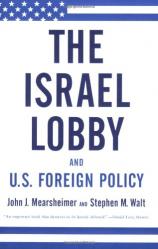Reading Group Guide
Discussion Questions
The Israel Lobby and U.S. Foreign Policy

1. How familiar were you with the Israel lobby before reading this book? Did the authors change or reinforce your previous beliefs?
2. Were you surprised by the fact that the authors found it difficult to publish the original article, “The Israel Lobby,” in the United States? Would you have suspected such resistance from American editors?
3. The authors argue that the Cold War strategy of backing Israel as a deterrent to Soviet communism was not wholly successful. How did you respond to their summary of this history? In what other ways has Israel’s role in the international landscape changed since the Truman administration? What is the twenty-first-century equivalent of the Cold War?
4. What did you discover about the differences between aid and loan packages offered by the United States to various countries? How would you describe the support the United States gives to Israel? What levels of accountability should be in place for any nation receiving this kind of support? Should a country’s economic prosperity preclude it from receiving foreign aid? What costs and benefits does this aid to Israel and other countries bring to the United States?
5. How do the authors distinguish between their support for Israel’s moral right to exist and their criticism of Israeli policies and lobby groups such as the American Israel Public Affairs Committee (AIPAC)? Does the tragic legacy of anti-Semitism entitle Israel to exceptional status? What is the reality of Israel’s current military vulnerability?
6. At the heart of the debate captured in The Israel Lobby and U. S. Foreign Policy is the question of whether someone who opposes the lobby also undermines security for Jews in Israel. Are Judaism and Zionism synonymous? How did the Six-Day War change the nature of this question and redefine what it meant to support Israel?
7. Were you aware of the fundamentalist Christian cohort within the Israel lobby? What common and contradictory goals exist between various Jewish and Christian Zionist organizations? How does this relationship fit into attitudes like those of the journalist Bret Stephens, who wrote, “One must be at least a Jew to tell the goyim how they may or may not talk about Israel” (p. 174)?
8. How did you react to the authors’ observations about the lobby’s efforts to influence higher education in America? To what degree should academic freedom be unlimited?
9. The book contains commentary from politicians who describe the necessity of securing the support of AIPAC and related groups even though such organizations represent a minority of voters’ opinions. What does this say about the power of lobbies in America? How easy (or difficult) is it for the wishes of the majority to be overlooked in our democratic process?
10. Discuss the history of Middle East diplomacy described in The Israel Lobby and U. S. Foreign Policy, particularly the frustrating experiences of Colin Powell and Condoleezza Rice. What should the role of diplomacy be in current debates about the expansion of Israeli settlements in the West Bank?
11. Chapter eight addresses the overthrow of Saddam Hussein. The authors suggest that the support of the major organizations in the Israel lobby and Israeli leaders played a critical role in the decision to invade Iraq. Do you agree with the authors’ assessment of Israeli involvement and the impact of the Israel lobby on the decision to go to war? What were your theories about the U.S. invasion of Iraq?
12. What themes recur in the book’s chapters on Syria, Iran, and Lebanon? Is the use of cluster bombs against civilian populations ever justified, a controversy discussed in chapter eleven? What is the impact of the Israel lobby on U.S. interests in the Middle East? What are the consequences for Israel?
13. How has the Israel lobby shaped U.S. policy toward the Palestinians and the “two-state solution”? How has this policy changed over the past few administrations? Should the PLO be treated differently than other terrorist organizations, such as al Qaeda?
14. In their conclusion, “What Is to Be Done?,” the authors maintain that one essential strategy in a new U.S. Middle East policy should be to treat Israel as a normal country. What are the potential ramifications of this approach?
15. The claims made in The Israel Lobby and U. S. Foreign Policy are supported by more than 1,300 footnotes, many of them derived from books, newspapers, and magazines that are available to the general reader. How do you evaluate the authors’ research? Much of this information is in the public domain --- how would you describe the public discussion of the U.S.-Israel relationship and Israel’s policies? What role does the mainstream media play in shaping this discussion?
16. Israeli Prime Minister Ehud Olmert, who announced his resignation in 2008, is referred to throughout The Israel Lobby. How did his rule differ from that of his predecessors? What do you predict for the future of Israeli leadership?
The Israel Lobby and U.S. Foreign Policy
- Publication Date: September 2, 2008
- Paperback: 496 pages
- Publisher: Farrar, Straus and Giroux
- ISBN-10: 0374531501
- ISBN-13: 9780374531508







